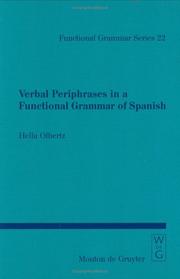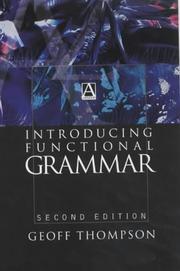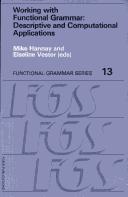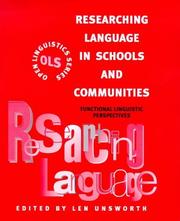| Listing 1 - 10 of 191 | << page >> |
Sort by
|
Book
ISBN: 3944675193 9783944675190 9783944675701 9783944675718 Year: 2014 Publisher: Berlin Language Science Press
Abstract | Keywords | Export | Availability | Bookmark
 Loading...
Loading...Choose an application
- Reference Manager
- EndNote
- RefWorks (Direct export to RefWorks)
Case-systems all over the world exhibit striking similarities. In most languages intransitive subjects (S) receives less overt marking than one of the two transitive arguments (agent-like A or patient-like P); the other one of these two arguments is usually encoded by the same form as S. In some languages the amount of overt marking is identical between S, A, and P. But hardly ever does the S argument receive more overt marking than A or P. Yet there are some languages that do not follow this general pattern. This book is about those languages that behave differently, the marked-S languages. Marked-S languages are well-known to be found in East Africa, where they occur in two different language families, Afro-Asiatic and Nilo-Sa-haran. They can also be found in North-Western America and the Pacific region. This book is the first investigation of marked S-languages that treats the phenomenon on a global scale. The study examines the functional distribution of the two main case-forms, the form used for S (S-case) and the case-form of the transitive argument which receives less marking (the zero-case). It offers a very fine-grained perspective considering a wide range of constructions. The contexts in which the case-marking patterns are investigated include nominal, existential and locational predication, subjects in special discourse function (e. g. focused constituents), subjects of passives and dependent clauses, as well as the forms used for addressing someone (vocative form)and for using a noun in isolation (citation form). Apart from the functional distribution of case forms, the formal means of marking are also considered. The main focus is on the synchronic description and comparison of marked-S languages, but historical explanations for the unusual case-marking pattern are also discussed.
Functionalism (Linguistics) --- Grammar, Comparative and general --- Case. --- Functional analysis (Linguistics) --- Functional grammar --- Functional linguistics --- Functional-structural analysis (Linguistics) --- Grammar, Functional --- Grammatical functions --- Linguistics --- Structural linguistics --- Philology --- Case

ISBN: 3110154021 3110820889 Year: 1998 Volume: 22 Publisher: Berlin Mouton de Gruyter
Abstract | Keywords | Export | Availability | Bookmark
 Loading...
Loading...Choose an application
- Reference Manager
- EndNote
- RefWorks (Direct export to RefWorks)
Spanish language --- Grammar --- Functionalism (Linguistics) --- Functional analysis (Linguistics) --- Functional grammar --- Functional linguistics --- Functional-structural analysis (Linguistics) --- Grammar, Functional --- Grammatical functions --- Linguistics --- Structural linguistics --- Verb --- Functionalism (Linguistics). --- Verb.
Book
ISBN: 9027215669 9789027215666 9789027292803 9027292809 1282154923 9781282154926 9786612154928 6612154926 Year: 2006 Volume: 57 Publisher: Amsterdam Benjamins
Abstract | Keywords | Export | Availability | Bookmark
 Loading...
Loading...Choose an application
- Reference Manager
- EndNote
- RefWorks (Direct export to RefWorks)
This article extends the boundaries of Columbia School linguistic semantic theory by applying its analytical constructs to nonlinguistic behaviors, where, as in language, there exist systematicity and arbitrariness: food; construction of social and gender identity; and use of architectural, private, and urban space. Further, meaningful elements of these behaviors vary analogously to Labovian sociolinguistic feature variation. The guiding orientation is that human behavior is structured not by an unmotivated, autonomous culture, but is communicative and social, interpreted by people as signals with meanings; and these meanings are discerned as interpreting power, prestige and identity. Data come primarily from fieldwork in Lamu (Kenya) and Thailand.
Linguistics --- Functionalism (linguistics). --- Functionele linguïstiek. --- Funktionalismus (linguistik). --- Functionalism (Linguistics) --- Functional analysis (Linguistics) --- Functional grammar --- Functional linguistics --- Functional-structural analysis (Linguistics) --- Grammar, Functional --- Grammatical functions --- Structural linguistics --- Philosophy --- Language.

ISBN: 0340807164 9780340807163 Year: 1996 Publisher: London Arnold
Abstract | Keywords | Export | Availability | Bookmark
 Loading...
Loading...Choose an application
- Reference Manager
- EndNote
- RefWorks (Direct export to RefWorks)

ISBN: 3110154048 311015403X 3110154064 3110154056 9783110155396 9783110218374 3110218372 9783110154061 9786613398642 1283398648 3110218364 9783110154030 9783110154054 9783110154047 Year: 1997 Volume: 20 Publisher: Berlin De Gruyter
Abstract | Keywords | Export | Availability | Bookmark
 Loading...
Loading...Choose an application
- Reference Manager
- EndNote
- RefWorks (Direct export to RefWorks)
Introduction When one takes a functional approach to the study of natural languages, the ultimate questions one is interested in can be formulated as: How does the natural language user (NLU) work? How do speakers and addressees succeed ...
Functionalism (Linguistics). --- Functionalism (Linguistics) --- Grammar --- Functional analysis (Linguistics) --- Functional grammar --- Functional linguistics --- Functional-structural analysis (Linguistics) --- Grammar, Functional --- Grammatical functions --- Linguistics --- Structural linguistics --- English language --- Syntax. --- Germanic languages
Book
ISBN: 9788446035169 Year: 2012 Publisher: Madrid Akal
Abstract | Keywords | Export | Availability | Bookmark
 Loading...
Loading...Choose an application
- Reference Manager
- EndNote
- RefWorks (Direct export to RefWorks)
Functionalism (Linguistics) --- Role and reference grammar --- Grammar, Comparative and general --- Functional analysis (Linguistics) --- Functional grammar --- Functional linguistics --- Functional-structural analysis (Linguistics) --- Grammar, Functional --- Grammatical functions --- Linguistics --- Structural linguistics

ISBN: 9067654884 Year: 1990 Publisher: Dordrecht Foris
Abstract | Keywords | Export | Availability | Bookmark
 Loading...
Loading...Choose an application
- Reference Manager
- EndNote
- RefWorks (Direct export to RefWorks)
Book
ISBN: 1283233975 9786613233974 9027282013 9789027282019 1556193815 9781556193811 Year: 1996 Publisher: Amsterdam Philadelphia, PA J. Benjamins
Abstract | Keywords | Export | Availability | Bookmark
 Loading...
Loading...Choose an application
- Reference Manager
- EndNote
- RefWorks (Direct export to RefWorks)
This collection of papers offers an alternative to mainstream functional linguistics on two points. Especially in American linguistics, function and structure are often viewed almost as polar opposites; in addition, structure is often understood as being only a matter of linguistic form - or expression - as opposed to content. The book tries to illustrate why function and structure must be understood as mutually dependent in relation to language - and why the most interesting aspect of language structure is the way it structures the content side of language. In this, the book represents a reaf
Danish language --- Functionalism (Linguistics) --- Functional analysis (Linguistics) --- Functional grammar --- Functional linguistics --- Functional-structural analysis (Linguistics) --- Grammar, Functional --- Grammatical functions --- Linguistics --- Structural linguistics --- Grammar. --- Grammar --- Danish language - Grammar.

ISBN: 1281294659 9786611294656 1847140912 9781847140913 9780304702442 0304702447 9780304702459 0304702455 0826478719 9780826478719 9780826478719 9781847140913 0304702447 0304702455 9781281294654 6611294651 Year: 2000 Publisher: London ; Washington : Cassell,
Abstract | Keywords | Export | Availability | Bookmark
 Loading...
Loading...Choose an application
- Reference Manager
- EndNote
- RefWorks (Direct export to RefWorks)
Researching Language in Schools and Communities is designed for those who intend to carry out and / or study research in children's language development, teaching English as a second language, children's literature, casual conversation, social class and language variation, classroom discourse, reading processes, teaching writing, literacy and curriculum area learning, critical literacies and related areas. The contributors are among the foremost researchers in these fields. In this book they introduce approaches to help investigate such areas in applied language research using systemic
Linguistics --- Functionalism (Linguistics) --- Functional analysis (Linguistics) --- Functional grammar --- Functional linguistics --- Functional-structural analysis (Linguistics) --- Grammar, Functional --- Grammatical functions --- Structural linguistics --- Research. --- Functionalism (Linguistics).
Book
ISBN: 8024627655 9788024627656 9788024627427 8024627426 Year: 2014 Publisher: Praha Karolinum
Abstract | Keywords | Export | Availability | Bookmark
 Loading...
Loading...Choose an application
- Reference Manager
- EndNote
- RefWorks (Direct export to RefWorks)
| Listing 1 - 10 of 191 | << page >> |
Sort by
|

 Search
Search Feedback
Feedback About UniCat
About UniCat  Help
Help News
News